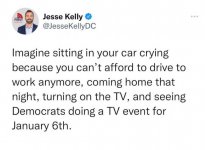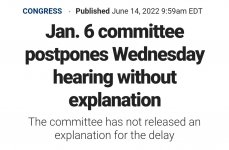Money was no doubt flowing in every direction with activists on both sides advocating for their side in the ongoing wars of words that are so poorly backed by proven facts and evidence.The Big Lie is, in reality, nothing more than a Big Grift:
The same goes for QAnon "influencers", right-wing self-appointed Christian "prophets", etc. They're all in it for the money that they can dupe from the MAGA numpties out there.
You are using an out of date browser. It may not display this or other websites correctly.
You should upgrade or use an alternative browser.
You should upgrade or use an alternative browser.
Fiona Hill: "The president was trying to stage a coup"
- Thread starter annabenedetti
- Start date
Money obtained through lies and corruption is dirty money, obtained by sinners in love with sin.They're talking about that right now. It's incredible, the bald grift.
1 Timothy 6:10
For the love of money is the root of all evil: which while some coveted after, they have erred from the faith, and pierced themselves through with many sorrows.
US intelligence officials lied to the President? Where have we heard that line before? Is anyone surprised to find out that government leaders and officials lie - sometimes regularly?Self-soothing memes will continue to comfort MAGA-land, but the information in this hearing - coming as it is from the lawyers and advisors around Trump - is so damning to Trump.
Acting DOJ Attorney Deputy General Richard Donoghue told Trump that the information he was getting was false. Trump said, 'what about Michigan' and Donoghue told him that the Michigan error rate was NOT 68%, it was .0063%. So Trump said, 'what about the truck driver' (this is for you, @chrysostom), and Donoghue said "PA truck driver who believed he had driven a tractor trailer truck of ballots from NY to PA we’ve looked at both ends, people who load, people who unload the truck, that allegation was not supported by the evidence..." and then Trump said, 'what about the suitcase...' 'what about the Indians...' 'what about the dead people...'
Over and over his campaign lawyers told Trump there was no there there. Trump just blew them all off.
Bill Barr: "... before the election it was possible to talk sense to the president... but after the election he didn't seem to be listening to me... or any of his other cabinet secretaries..."
Sadly, liars are in trouble with God who promises a bitter end for the unrepentant.
Revelation 21:8
But the fearful, and unbelieving, and the abominable, and murderers, and whoremongers, and sorcerers, and idolaters, and all liars, shall have their part in the lake which burneth with fire and brimstone: which is the second death.
Al Smitt needs to man up and stop acting like a baby. Maybe he did receive threats because Trump spoke the truth but even if true it was not Trump's fault that he spoke the truth. Smitt's whiney-baby complaint pales in the light of the threats and assaults good men like Rand Paul, Steve Scalise, and Brett Kavanaugh have experienced due to the hateful rhetoric of prominent democrats.
Dead people did vote in 2020 and democrats continue to lie about it. That is inexcusable.
![DCNF-large ADAMS: The Evidence Is Real — Dead People Are Voting Featured Opinion [your]NEWS DCNF-large ADAMS: The Evidence Is Real — Dead People Are Voting Featured Opinion [your]NEWS](https://dailycaller.com/files/images/DCNF-large.jpg)
The 2020 election was full of chaos and irregularities. States like Georgia and Pennsylvania took days to finalize election results. Mail ballots were found on floors of apartment floor lobbies. Dead people were even voting in states across the country!
Unfortunately, people have been voting from beyond the grave since well before 2020. (RELATED: SNEAD: 2020’s Nightmare Election Process Has Come Back To Haunt Pennsylvania. Here’s What Needs To Change)
The left claims that voter fraud is non-existent, and that dead people are not voting. But, we have proof that deceased individuals are casting ballots.
The Public Interest Legal Foundation’s database of the country’s voter rolls found nearly 350,000 deceased registrants before the 2020 election. The inevitable question is always well did any of them vote. Unfortunately, some always do.
The Foundation is even beginning to see people being registered after their death. Yes, you read that right. People are registering deceased individuals to vote.
One such individual the Public Interest Legal Foundation uncovered was Judith Presto. Presto voted in the 2020 election in Pennsylvania. She died in 2013. Closer examination of our data revealed her husband registered and voted for her following her death.
We turned this information in to Pennsylvania authorities, which led to the ultimate arrest of her husband.
My organization sued Pennsylvania to remove the over 20,000 deceased registrants from the Commonwealth’s voter rolls. In one of the few victories for election integrity in 2020, we won the case. Pennsylvania has removed the deceased registrants from their voter rolls. It is now a lot harder to vote from beyond the grave in Pennsylvania.
There is still work to be done to stop the dead from voting in other states.
For instance, Michigan has over 25,000 deceased registrants still on its voter rolls, according to the Foundation. Nearly 4,000 of these registrants have been dead for at least two decades. We are suing them just like we did Pennsylvania.
Another state with an upcoming Senate race in 2022, North Carolina, also has a high number of deceased individuals on their voter rolls, we found. The state has nearly 8,000 deceased registrants still on the voter rolls.
To stop the dead from voting, secretary of States across the country need to do their job. This is about good government. Election officials need to keep the voter rolls clean and up to date. This would easily solve the problem of dead people voting.
When individuals die, they must be promptly removed from the voter rolls as required by federal law. There is no excuse for allowing deceased registrants to remain on the voter rolls.
We can all agree that we don’t want the ghosts of the dead casting deciding ballots in our elections.
All 50 states need to take a serious look at their voter rolls and make serious efforts to remove all the deceased individuals before the 2022 elections. They are running out of time. It will be Election Day before you know it.
I don't think poor Billy boy knows he is propagating the big lie of supposed democrat honesty and integrity in elections.
Trump spoke the truth about the seditious democrat theft of the 2020 election and now poor people across the nation are suffering the financially devastating effects of that theft.On election night Bill Stepien told Trump about how early votes always favor the Republican candidates, and the later counting of the mail-in votes favor Democrats (the so called "red mirage").
So Trump took drunk Rudy's advice instead, and went out to the cameras, claimed victory - and fraud - and that the vote-counting should stop.
Oppressive US regulations and out-of-control inflation among other factors are causing gas prices to rise in America while worldwide inflation, global warming foolishness, wars, and greed are affecting gas prices worldwide.Really? Since the price of oil is determined by the global market, how is it possible that US government regulations on refining oil into gasoline have caused the price of oil to rise around the world?
Oppressive US regulations and out-of-control inflation among other factors are causing gas prices to rise in America
Inflation is a global phenomenon, as is the rising price of oil. Trump and Putin did that.
How did Trump and Putin do it? By manipulating stock like Soros did to get rich? By giving each other gifts and benefits like were exchanged between Putin and the Clintons? By promoting communism together? What sort of inside information have you got, something hidden in Adam Schiff's vault under whistleblower protection?Inflation is a global phenomenon, as is the rising price of oil. Trump and Putin did that.
What causes inflation? This paper lists several things. Here are a few:Inflation is a global phenomenon, as is the rising price of oil. Trump and Putin did that.

Investing | SoFi Learn
For new investors and experts alike, learn about mutual funds, stocks, and everything in between. We’re here to help you learn how to grow your money.
www.sofi.com
2. There Is More Currency Available
Inflation can also occur when the Fed, or another central bank, adds fiat currency into circulation at a rate that exceeds that of the economy’s growth rate. That creates a situation in which there are more dollars bidding on fewer goods and services. The result is that goods and services cost more.5. The Government Implements Expansionary Fiscal Policies
The federal government will occasionally try to jumpstart economic growth with new policies. These expansionary fiscal policies often seek to increase the amount of discretionary income that businesses and consumers have to spend.6. New Regulations Increase Costs
While a shortage of an essential commodity, like oil, can cause inflation, so can an increase in costs related to a commodity suddenly becoming more expensive because of government regulations.These factors seem logical to me. What do you think are the primary factors driving up inflation that hurts poor people so horribly?
Idolater
Popetard
Yeah President Trump did not do that.Inflation is a global phenomenon, as is the rising price of oil. Trump and Putin did that.
Trump did not.How did Trump and Putin do it?
ok doser
lifeguard at the cement pond
Trolls gotta trollYeah President Trump did not do that.
Trump did not.
Meanwhile:
According to a report from the U.S. Energy Information Administration that was released in December, a mere six months ago, they anticipated gas prices to average $2.88/gal this year.

LOL: Here’s What the Biden Admin Claimed Gas Prices Would Be This Year
In November 2020, experts came out of the woodwork to dismiss the idea that gas prices would skyrock
ok doser
lifeguard at the cement pond
With no end in sight:

 www.washingtonexaminer.com
www.washingtonexaminer.com
Inflation at 10.8% in producer index for May, near highest on record

Inflation at 10.8% in producer index for May, near highest on record
Inflation as measured by producer wholesale prices ticked down to a still-smoldering 10.8% for the year ending in May, according to a report Tuesday from
Yeah President Trump did not do that.
You don't seem to remember Trump's shutdown of the economy during the coronavirus or his extremely high deficit spending, both of which contributed massively to the high inflation we're seeing now. Putin is also contributing with his warmongering in Ukraine, which has caused oil prices to skyrocket.
annabenedetti
like marbles on glass
Team Putin in a Panic Over Jan. 6 Hearings
Kremlin propagandists fear their favorite presidential candidate is having his re-election chances hammered by televised hearingsThe House select committee’s primetime Jan. 6. hearings are causing conniptions in Moscow.
The attempted insurrection was embraced by the Kremlin as cause célèbre, with Russian President Vladimir Putin himself calling for an investigation into the death of Ashli Babbitt, who was part of the crowd attacking the U.S. Capitol. Russia’s state-controlled media obsessively covered the notorious attack, praising the would-be insurrectionists as law-abiding protesters and criticizing the United States for prosecuting them. But now, propagandists seem to be concerned that the hearings may negatively impact the chances of re-election for their so-called “partner,” former U.S. President Donald J. Trump.
Kremlin-controlled state media has been relishing the faltering popularity ratings of President Biden, describing Trump as a shoo-in for re-election and openly hoping that a Republican takeover in the midterms would spell a change in America’s foreign policy towards Ukraine. The Jan. 6 committee hearings seem to be a fly in the ointment and now Putin’s propagandists are no longer certain of what the future elections might hold.
annabenedetti
like marbles on glass
New details emerge of Oval Office confrontation three days before Jan. 6
Jeffrey Clark, a mid-level Justice Department official, wanted Trump to name him attorney general in a plan aimed at potentially overturning the election
Three days before Congress was slated to certify the 2020 presidential election, a little-known Justice Department official named Jeffrey Clark rushed to meet President Donald Trump in the Oval Office to discuss a last-ditch attempt to reverse the results.
Clark, an environmental lawyer by trade, had outlined a plan in a letter he wanted to send to the leaders of key states Joe Biden won. It said that the Justice Department had “identified significant concerns” about the vote and that the states should consider sending “a separate slate of electors supporting Donald J. Trump” for Congress to approve.
In fact, Clark’s bosses had warned there was not evidence to overturn the election and had rejected his letter days earlier. Now they learned
Clark was about to meet with Trump. Acting attorney general Jeffrey Rosen tracked down his deputy, Richard Donoghue, who had been walking on the Mall in muddy jeans and an Army T-shirt. There was no time to change. They raced to the Oval Office.
As Rosen and Donoghue listened, Clark told Trump that he would send the letter if the president named him attorney general.
“History is calling,” Clark told the president, according to a deposition from Donoghue excerpted in a recent court filing. “This is our opportunity. We can get this done.”
. . . .
After the New York Times reported in January 2021 about Clark’s actions, he said he engaged in a “candid discussion of options and pros and cons with the president,” denied that he had a plan to oust Rosen, and criticized others in the meeting for talking publicly and “distorting” the discussion.
Now, however, key witnesses have provided Congress with a fuller account of Clark’s actions, including new details about the confrontation that took place in the Jan. 3 Oval Office meeting, which lasted nearly three hours.
. . . .
The evidence, which fills in crucial details about Clark’s efforts, includes an email showing he was sent a draft of a letter outlining a plan to try to overturn the election by a just-arrived Justice Department official who had once written a book claiming President Barack Obama planned to “subvert the Constitution.”
But larger mysteries could still be solved at an upcoming Jan. 6 committee hearing slated to examine Clark’s actions, including the crucial question of whether Clark and his allies were acting on their own initiative — or whether they were one piece of a larger, well-planned effort to keep Trump in power. That question gets to the heart of the committee’s professed mission: proving there was a “coordinated, multi-step effort to overturn the 2020 presidential election.”
Sen. Sheldon Whitehouse (D-R.I.), who participated in the Judiciary Committee’s investigation, said investigators should key in on whether Clark was working on behalf of others not yet identified.
“It certainly could be a symptom of a much larger and more coherent plan than has currently been disclosed,” Whitehouse said. Clark “does not appear to have elections expertise or experience, which raises the question, did he really sit down at his computer and type it out or does somebody produce it for him?”
From your source:Trolls gotta troll
Meanwhile:
According to a report from the U.S. Energy Information Administration that was released in December, a mere six months ago, they anticipated gas prices to average $2.88/gal this year.

LOL: Here’s What the Biden Admin Claimed Gas Prices Would Be This Year
In November 2020, experts came out of the woodwork to dismiss the idea that gas prices would skyrockpjmedia.com
In November 2020, experts came out of the woodwork to dismiss the idea that gas prices would skyrocket under Joe Biden as conservatives predicted.
“A dubious meme has emerged online in conservative circles: The price of gasoline will spike because Joe Biden is taking office,” the Washington Post reported in November 2020. The meme featured a gas station with gas prices of over $5.00/gal, but the author dismissed the meme, insisting that “although a president’s actions — including Biden’s climate policies — can nudge the price of oil, the effect is marginal at best, experts say.”
Were the democrats deliberately lying or just wrong in their predictions? Either way, they prove they are not qualified and fit to run the country because of dishonesty or ignorance.





